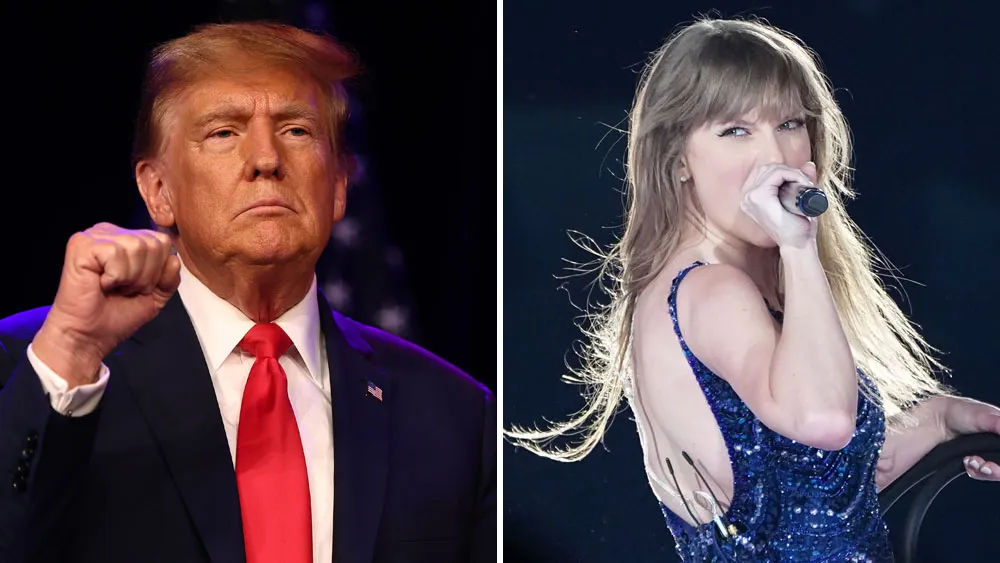Taylor Swift
slams trump for playing her music at his rally
In a recent statement, Taylor Swift voiced her strong disapproval of former President Donald Trump using her music at his rallies. This incident has reignited the debate over artists’ rights and political affiliations, and it highlights the ongoing tension between celebrities and politicians when it comes to the use of copyrighted material.
Swift’s response was a powerful assertion of her autonomy and an indictment of how her work was being used to support a political figure whose values she fundamentally opposes. Her music, known for its lyrical depth and personal introspection, has often touched on themes of empowerment, individuality, and social justice. To have her songs co-opted by a figure whose policies and rhetoric she finds objectionable was, understandably, a deeply personal affront.
### The Background
The controversy began when Trump’s campaign played Swift’s hit songs at a rally. The use of popular music at political events is a common practice, intended to energize the crowd and create a memorable atmosphere. However, this practice often runs afoul of artists who do not endorse the political messages associated with the events where their music is played.
In this case, Taylor Swift’s music was used without her permission. While it is not uncommon for politicians to use songs by various artists to accompany their campaigns, the situation is complicated when the artist’s political views are diametrically opposed to those of the politician. Swift has been vocal about her political beliefs and has used her platform to advocate for progressive causes and support Democratic candidates. The use of her music by Trump was thus not just a legal issue but a deeply personal and political one.
### Taylor Swift’s Response
Taylor Swift’s reaction was swift and unequivocal. She issued a public statement condemning the use of her music at Trump’s rally, expressing her disapproval not only of the way her work was used but also of the underlying political message it supported. Swift’s statement highlighted her concern about the values promoted by Trump and how they conflicted with her own principles.
In her statement, Swift emphasized that she does not support Trump’s policies and that using her music in that context was a misuse of her work. She underscored the importance of consent and respect for artists’ rights, stressing that no artist should have their music used to further a political agenda they do not endorse. Swift’s stance reflects her commitment to her own values and her desire to maintain integrity in how her art is presented and associated.
### The Legal and Ethical Implications
From a legal perspective, the unauthorized use of copyrighted music at political rallies is a violation of intellectual property rights. Artists like Swift have control over how their music is used, and using it without permission can result in legal repercussions. This issue is not only about protecting legal rights but also about respecting the ethical boundaries that artists set regarding their work.
The ethical dimension is particularly significant. Artists often see their music as a form of personal expression, and having it co-opted for purposes contrary to their values can feel like a betrayal. For many, the use of their work in a political context can be seen as a manipulation of their artistic voice to serve agendas they do not support.
### Broader Implications
Swift’s response to the unauthorized use of her music is part of a larger conversation about the intersection of celebrity culture and politics. Celebrities have increasingly become vocal about their political views, and their work is frequently used in political campaigns, sometimes without their consent. This raises questions about the power dynamics between artists and political figures and about the respect owed to artists as individuals with their own political beliefs and values.
The situation also underscores the need for clear guidelines and respect for intellectual property. As political campaigns continue to use music to enhance their events, ensuring that they do so with proper authorization and respect for the artists involved is crucial. This respect is not only about legal compliance but also about acknowledging the artistic and personal significance of the work.
### Conclusion
Taylor Swift’s strong reaction to Donald Trump’s use of her music at his rally serves as a powerful reminder of the importance of respecting artists’ rights and values. Her condemnation of the misuse of her work highlights the broader issues of consent, political affiliation, and the ethical use of intellectual property. As artists continue to navigate the complex relationship between their work and political agendas, Swift’s stance provides a clear example of how they can assert their rights and uphold their personal and political principles. This incident serves as a critical point of reflection for both the music industry and political campaigns, emphasizing the need for respectful and consensual use of artistic work.
